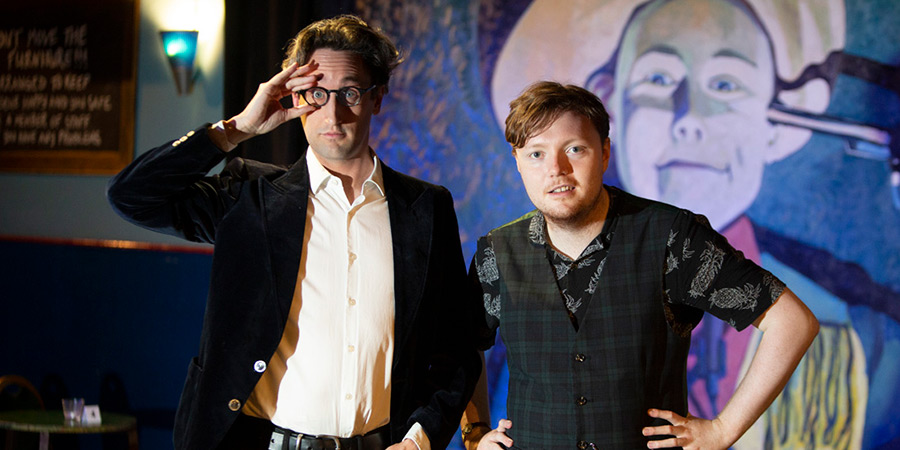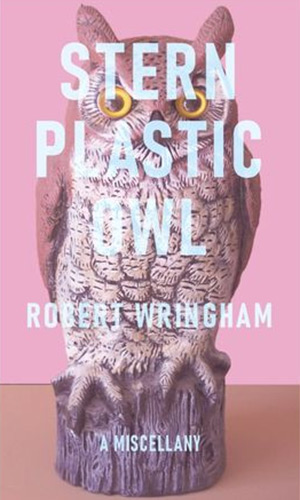Robert Wringham: 'The highest form of activity is the shenanigan'

Comedian and long-term admirer Gabriel Featherstone talks to humourist Robert Wringham about his latest book, Stern Plastic Owl.
Robert Wringham is a lesser known, off-the-beaten track sort of humourist but his credentials are impressive. He was shortlisted for Canada's Leacock Medal for Humour and two of his books are published by Go Faster Stripe, that niche producer of rarified and high-minded comedy. He rubbed shoulders with Simon Munnery and Stewart Lee for a book about Cluub Zarathustra, and lent his humorous tone to a pair of well-received anti-self-help books called Escape Everything! and The Good Life for Wage Slaves.
His latest collection, Stern Plastic Owl, is out now and it includes some wonderful "nonecdotes" from his self-confessed idle life as well as a side-splitting rumination on the private life of H G Wells.
While David Sedaris is the reigning champ of humour writing today, Wringham's equivalent essays distinguish themselves by being shorter and more savage, and far, far sillier.
Hello Robert Wringham. Who are you and what have you done?
Hello Gabriel Featherstone. I am Robert Wringham as you well know, and I have made a book.
Made it?
Yes, I squeezed it out.
And it's called Stern Plastic Owl.
It was that or Tarantula Caviar.

What is it about? And why have you squeezed out such a thing?
It's a miscellany. Short essays and stories with a bit of a cheeky wink to them, like you'd see in old essay collections by S. J. Perelman or someone like that. Each piece is a little micro-adventure. Sometimes very micro. There's usually a single joke at the core of each piece, which I lean into or subvert or just play around with. It's fun!
As to why? Well, I've been writing short pieces like these for years. It's my thing. There's just something magical about the format of 800 words about basically anything but trying to make it into something original. I usually post early drafts to my blog and I sometimes get the finished pieces into magazines, but their natural habitat is really a book. There are little bridging tendons - recurring characters and phrases - that connect the pieces together.
Are you proud of yourself?
Immensely. The highest form of human activity is the shenanigan.
Aside from generally being unable to hear the booing, what other benefits does writing prose comedy have over performing live comedy?
You can do it in your pyjamas. Well, you can do live comedy in your pyjamas too, but only if it works with your stage persona. My page persona wears a suit and looks like an Aubrey Beardsley illustration or maybe a bit like one of those Nagel paintings from the '80s, but I secretly write in my pants and a fez, a crescent of testicle peeking playfully out.
Stand-up is often well-crafted but it has a loose vibe that's supposed to sound spontaneous. In books, you aren't quite allowed that illusion because the reader knows you're sitting at a desk, pouring literary science and hope into getting things right. Which is freeing rather than limiting if you look at it the right way; instead of trying to look spontaneous, I can show my workings and signpost the graft if I want to.
Stand-up and funny books come from a similar internal reservoir though. People don't generally see books, even funny ones, as performance but that's exactly what mine is. You can see movement on the page. Hopefully.

Stern Plastic Owl has five forewords in it. Have you some kind of fetish?
Yes, the walls of my hovel are lined with forewords. Hah. I liked the absurdity of it. After the book came out I read Sarah Silverman's Bedwetter and she does a similar thing, so at least I'm not alone.
I wrote two forewords for perfectly good reasons (they had two different jobs to do) but then I decided to demolish my own pretentiousness by having absolutely loads of them.
There should have been more, shouldn't there? One of the forewords appears in the middle of the book, by the way. And one of them is practically at the back. That way, the voice of the forewords becomes a sort-of character too.
I also like things that never get started, like Tristram Shandy, and things that feel like a placeholder for something else like "this is the speech I would be giving if only I'd prepared the speech but I didn't."
Despite all this, my book does get started. But it doesn't finish. That's another favourite move: I like it when a story ends abruptly as if we've run out of tape.
If H.G. Wells travelled to the present day in his sexy little time machine, how do you think he would react to your somewhat vulgar critique of his sexual memoir? Do you think he'd be a good sport, or would he strike you down like a dog?
You're referring to The Sex Life of H.G. Wells, which is probably the best story in the book. It's very rude indeed, but I think H. G. would like it because he clearly saw himself as a sauce pot.
I'm more concerned about my new idea, The Litigious Mr. Disney and His Many Mistresses.
If you had to choose one line from your new book to be your epitaph, which one would you choose?
Hot Victorian Chod.
Do you still tolerate the silverfish in your bathroom, or have they expanded their empire to devour everything you love?
Hah! So this is about a story in which I debate the ethics of murdering a colony of encroaching insects, little babies and all. In the end, we did the only thing we could and moved house. Let someone else grapple with their ethics. They're probably all dead now, aren't they? You just made me sad.
Throughout the book you frequently refer to the reader as Madam. Is the target audience for your book a specific individual?
I saw a spoof of my writing online once and it was full of Madams, but I really only do it occasionally. It's a little wink, I suppose. Or maybe I'm sending up the idea of authors having preconceptions about their readers, especially when they default to male pronouns or indulge in "the universal we." The universal wee, more like.
I also just like the idea of anyone using "madam" as a form of address full-stop. It makes you sound like a 1940s greengrocer.

In the book, you claim that Pablo Picasso is still alive and vainly attending exhibitions of his own work. My friend Pete claims to have seen Heath Ledger working as a pirate-themed entertainer at a resort in Lanzarote. Do you think Heath and Pablo hang out?
What a deluded fool your friend is. I, however, know what I saw and I saw Picasso. He was on his holidays and having a lovely time.
Were there any stories you considered including in the book that ended up being left out?
You'll probably see them in a third volume when I run out of puff.
I especially enjoyed the bit where you gleefully demolished some children in a game of whack-a-mole at The National Museum of Scotland. Have your fearsome whack-a-mole skills ever served you well outside of the beautiful game itself?
Being a whack-a-mole legend comes with certain responsibilities. I remember when I got my first mole-pummelling mallet (being a working-class boy from Dudley, mine was naturally a hand-me-down) and my father giving me a brisk lecture about raising the padded whacker only to moles. I hope one day to inspire similar values in a young person, but they will have to defeat me in battle first. Fat chance. Children are sniveling weaklings with absolutely no mole-mashing mettle.
You have a gift for finding joy and wonder in trivial and commonplace things. Has this made you a happy man?
Yes, but it causes problems when crossing roads.
My favourite part of the book concerns your thwarted research into the structure and norms of ghost society. Have you ever considered doing a thorough study of the occult?
The only thing I do thoroughly is punchlines. Drive them into the dirt, I do.
It's nice that the ghost piece is your favourite. That one started life as a performance piece and was never posted or printed anywhere until now. It's about what the experience of ghosts would actually be like if they were real, how it could all possibly work, but it's structured as an interview with someone who professes to be an expert on something that isn't real.
What do you hope people will say about you after they've read your book?
If it's through my splayed-open letterbox it had better be polite. And non-flammable.
You devoted three entire pages of book to describing yourself asleep in your bedroom. From what source do you draw your audacity? (Just to be clear, I really liked this bit.)
Some people write about events. I, however, am an iconoclast.
What do your friends and loved ones think of the new book?
I have not told them about it. They think I work in a museum or something. I forget what lie I told them now. God, I'd love to work in a museum.

When you described your excellent coconut-centric wedding, you imagined yourself as a child being profoundly critical of your life choices. I believe his exact words were: "What the fuck?" Do you think your childhood self would enjoy your new book?
My childhood self was a miniature megalomaniac. He wanted to be a millionaire and "an important cultural voice." I think he felt quite thwarted by being 7. That's a good core joke, which is why I bring out Young Wringham as a character sometimes.
He'd probably assume this book was just one small piece of the thriving media empire I should have built in his name by now and, if told that it's actually just one of a handful of lightweight books I've written, he'd be disappointed. Maybe I could blame the pandemic.
Throughout the book, you make reference to feasting on people's bones and tearing the town to pieces. The latter is clearly an echo of a line from the great Ivor Cutler's Bicarbonate of Chicken. Do you know of any other such echoes in your book? Where does the bone feasting come from?
Actually, I try to avoid references to other funny things, but that one evidently got through. You're nice to call it an echo but I'm afraid it's an inadvertent scav job. The problem is that I learned to speak, never mind write, by gobbling up the words of a hundred humorists and a Reliant Robin's worth of stand-ups. I try to expunge any hint of that, but evidently this one got through.
By the way, a lot of writers don't get along with the word "humourist" even if their work is humorously intended, but your boyfriend Ivor Cutler actively courted it. I like it too: I think it explains everything. "Writer" is too general and "comedian" makes people think of stand-up.
Bone-feasting is probably from my own imagination though it sounds like something from Brothers Grimm or The BFG. I can usually trace any joke back a little way: I remember watching [TV game show] The Chase while visiting family and shouting "SHE'S GOING TO EAT YOUR BALLS!" when [professional quizzer] Anne Hegerty came out to humble a plumber. That's far too Route One for actual work, so I suppose it became "feast on your bones."
Come to think of it, my "madam" probably owes something to Harry Hill or Frankie Howerd.
What's next for Robert Wringham?
A relaxing soak in the bathtub, I reckon.
No, really, I'm writing a whole novel about a relaxing soak in the bathtub. If I can get past the research phase, that is. It'll be called Rub-a-Dub-Dub or maybe Submergency.
Your heckler retort, "Sir, you couldn't count the number of cylinders I'm firing on" is objectively one of the funniest lines of stand-up ever written. Is there anything I can say or do to persuade you to lower yourself back into the base medium of stand-up comedy?
You are a sweet and lovely boy. I like the idea of people who enjoyed Stern Plastic Owl coming along to throw Alka-Seltzer tablets (which feature prominently in the book) at me. But then I pull myself together.
I arrange books on my shelves alphabetically by the author's surname. On my shelf, your books are sandwiched between the works of PG Wodehouse and John Wyndham. How does that make you feel?
Clammy.
Robert Wringham's Stern Plastic Owl is available from Go Faster Stripe.
Help us publish more great content by becoming a BCG Supporter. You'll be backing our mission to champion, celebrate and promote British comedy in all its forms: past, present and future.
We understand times are tough, but if you believe in the power of laughter we'd be honoured to have you join us. Advertising doesn't cover our costs, so every single donation matters and is put to good use. Thank you.
Love comedy? Find out moreRobert Wringham - Stern Plastic Owl

A collection of short essays and flash fiction compiled by Robert Wringham.
"Sir, you couldn't count the number of cylinders I'm firing on..."
Meet Robert Wringham. He strides across the landscape of a slightly fantastical world. It's the same world that you and I live in... only more so.
It's a STERN world.
It's a PLASTIC world.
You'd better believe it's an OWL world.
It's the world of the STERN PLASTIC I-KNOW-NOT-WHAT.
- Is it possible to walk through a duckpond using a corncob pipe for air?
- Just what was H.G. Wells like in the sack?
- And how high can you raise the eyebrow before it interferes with the flightpaths of planes?
Deft Mr. Wringham skirts around these questions and more in his latest collection of what The Financial Times recently described as "some dope shit"*, some thirty classic pieces tenderly gouged from their original contexts and artfully mashed into book form.
*they said no such thing.
First published: Sunday 1st August 2021
- Publisher: Go Faster Stripe
![]() Buy and sell old and new items
Buy and sell old and new items
Search for this product on eBay
BCG may earn commission on sales generated through the links above.

